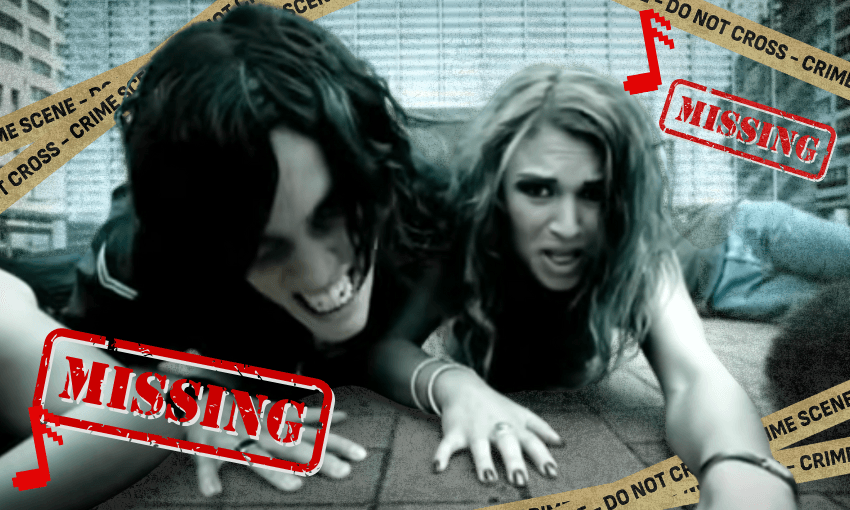Aaron Yap argues that family crime drama Brotherhood deserves to steal some of the family-crime-drama limelight away from its older television siblings. //
One consequence of the monumental successes of The Sopranos and The Wire is that a perfectly decent show like Showtime’s Brotherhood remains undeservedly underseen, unable to escape from their far-reaching shadows. This crime drama, shepherded by Blake Masters (Law & Order: LA) over three seasons, first aired in 2008 to low viewership. Practically all reviews, both good and bad, were quick to point out similarities to those two HBO giants, as if it were a lesser pretender.
However seen in isolation, away from the deafening hype of those two trendsetters, Brotherhood fares better. The first season proves that Masters, whilst lacking the visionary showrunner experience of Davids Simon and Chase, had crafted a sharply entertaining, solidly acted drama whose old-fashioned pleasures won’t be lost on viewers who are willing to stick with it.
With a focus on the machinations and intertwining of criminal and political organisations, Brotherhood fuses the best of those two worlds. The show is peopled by memorably larger-than-life, tripwire-tempered mob figures. They live by strict codes and strong family ties – while blithely committing the grisliest violence imaginable
They’re also nestled within a larger portrait of an Irish-American neighbourhood known as “The Hill” in Rhode Island’s capital Providence. Here we witness the working mechanisms of a complex social chain, peeking behind the doors of top brass senate meetings – all the way down to the hard done-by blue collar environs and street corners where underage kids can be found peddling dope.
Perhaps not helping ward off criticisms of familiarity and derivativeness is the core of Brotherhood’s tale – siblings on opposing sides of the law – only one of the mustiest of narrative chestnuts. Masters may be over-ambitious in aiming for a Cain-and-Abel-type allegory (season one’s episode titles reference biblical passages), but the conflict itself works comfortably in a serialised format, richly packing the show with time-tested ethical quandaries and moral grey areas that make for terrifically gripping drama.
Initially, the premise dictates that the Caffee brothers are polar opposites. Returning to The Hill after seven years of absence, the presumed-dead, sociopathic crim Michael (Jason Isaacs) is nothing more than a pain-in-the-ass for younger brother Tommy (Jason Clarke) – a rising politician and family man who’d like to distance himself from the guy as much as possible.
Michael’s reputation as a brutal, merciless thug is displayed early with a particularly vicious ear-slicing incident then, as the season progresses, it’s clear he’s not the most popular person for anyone – family or otherwise – to have around, but an uncontrollable catalyst for all manner of trouble. As The Hill’s resident Irish mob boss Freddie Cork (Kevin Chapman) opines to Michael, “your brother is a pandemic – he’s a Biblical fucking plague”.
Brotherhood gets compelling as it muddies the water between the two Caffees, testing their volatile fealty along the way. Fuelled by fiery ambition (yes, more than a hint of The Wire’s Carcetti there), Tommy’s moral compass is far from perfect. When pushed, we see a man who’s not above deceitful maneuverings to get what he wants. It’s a kind of self-serving dishonesty, under the guise of righteousness – it’s for the family/the best of the community – that delineates Tommy with the makings of a shady white-collar crook whom, in some ways, is just as bad, if not worse, than Michael. At least Michael has the virtue of being open about his flaws (“I’m a criminal. It’s ugly and it’s not fun”).
Casting the Caffee brothers is crucial to making Brotherhood pop, and Masters found them in an unconventional pair of non-American actors, Jason Clarke (Australian) and Jason Isaacs (British). They don’t exactly exhibit a true physical likeness, but convincingly nail the accents and most importantly, the tempestuous chemistry of the Caffees. For those only familiar with his current ascent into generically rugged, less dimensional Hollywood action lead roles (White House Down, Dawn of the Planet of the Apes), Clarke might surprise here in a meatier part inhabiting Tommy’s working class moxie and resourceful cunning. Isaacs, best known for playing Lucius Malfoy in the Harry Potter films, is a force of steely magnetism coupled with a dash of charm that’s hard to resist despite his repugnant behaviour.
The rest of Brotherhood’s supporting characters can border on caricature, such as the Caffees’ shrilly written, high-strung mother Rose (Fionnula Flannagan), or childhood friend/donut-munching cop Decko (Ethan Embry). But they remain watchable on strength of the actors, and occasionally – in the case of Annabeth Gish’s Edie Falco/Anna Gunn-type lonely, depressive housewife – are good enough to excuse their somewhat frustratingly erratic arcs.
Ultimately Brotherhood’s approach is broader than either The Sopranos and The Wire, and that’s fine – I don’t require every crime drama to possess Simon’s novelistic sprawl nor Chase’s sublime gangster revisionism. The first season, with sturdy TV workhorses like Ed Bianchi, Nick Gomez and Brian Kirk at the helm, does its job establishing a living, breathing, authentic-feeling community. The frayed familial bonds, the criminal undercurrent rippling beneath and the political powers attempting to keep the city’s blood pumping. Brotherhood burns slowly, but when its slew of subplots converge during the tense finale – with pretty much every character somehow placed in the same location together – you’ll be clamouring for more shit to hit the fan in the next season.
Lightbox users, click here to join the Brotherhood right now



